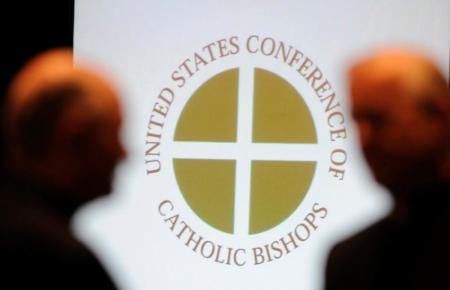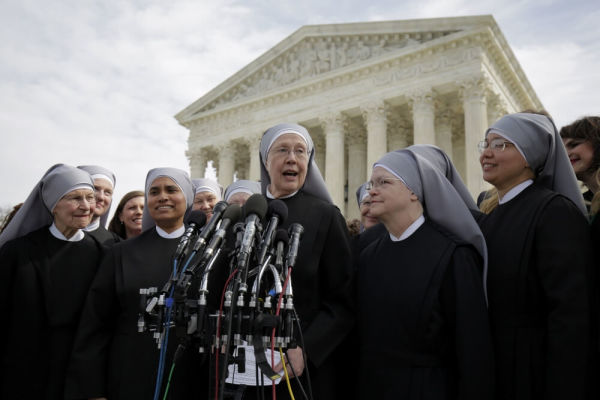Catholic bishops condemn gender transition surgeries as contrary to the 'created order'

The governing body of the Catholic bishops in the United States has labeled gender transition surgeries as contrary to the "created order" ordained by God and proclaimed that Catholic hospitals must not perform them.
The U.S. Conference of Catholic Bishops' Committee on Doctrine released a "Doctrinal Note on the Moral Limits to Technological Manipulation of the Human Body" Monday. The document began by noting how "modern technology offers an ever-increasing range of means — chemical, surgical, genetic — for intervening in the functioning of the human body, as well as for modifying its appearance," describing its role in curing "human maladies" as a "great boon to humanity."
The statement clarified that modern technology has also led to the creation of "interventions that are injurious to the true flourishing of the human person," asserting that "careful moral discernment is needed to determine which possibilities should be realized and which should not, in order to promote the good of the human person."
The document cited an understanding of "the created order inscribed in our human nature" as a necessary tool for such discernment.
"A crucial aspect of the order of nature created by God is the body-soul unity of each human person," the document stated. "Throughout her history, the Church has opposed dualistic conceptions of the human person that do not regard the body as an intrinsic part of the human person, as if the soul were essentially complete in itself and the body were merely an instrument used by the soul."
The lead signatory on the document is USCCB Committee on Doctrine Chairman Bishop Daniel Flores of the Roman Catholic Diocese of Brownsville in Texas.
Additional signatories include Bishop Michael Barber of the Diocese of Oakland, Auxiliary Bishop Richard Henning of the Diocese of Rockville Centre, Bishop Steven Lopes of the Personal Ordinate of the Chair of St. Peter, Auxiliary Bishop James Massa of the Diocese of Brooklyn, Bishop Robert McManus of the Diocese of Worcester, Bishop Michael Olson of the Diocese of Fort Worth, Bishop Kevin Rhoades of the Diocese of Fort Wayne-South Bend and Archbishop William Lori of the Archdiocese of Baltimore.
According to the bishops who signed the document: "The soul does not come into existence on its own and somehow happen to be in this body, as if it could just as well be in a different body. A soul can never be in another body, much less be in the wrong body. This soul only comes into existence together with this body."
The statement quoted from the Catechism of the Catholic Church, which declares that "Man and woman have been created, which is to say, willed by God: on the one hand, in perfect equality as human persons; on the other, in their respective beings as man and woman. 'Being man' or 'being woman' is a reality which is good and willed by God."
The Congregation for the Doctrine of the Faith insists "the importance and the meaning of sexual difference, as a reality deeply inscribed in man and woman, needs to be noted."
"In our contemporary society there are those who do not share this conception of the human person," the bishops noted. "Pope Francis has spoken about an ideology that promotes 'a personal identity and emotional intimacy radically separated from the biological difference between male and female' in which 'human identity becomes the choice of the individual, one which can also change over time."
The bishops criticized "attempts to alter the fundamental order of the human body" and "the range of technological interventions advocated by many in our society as treatments for what is termed 'gender dysphoria' or 'gender incongruence.'"
"These interventions involve the use of surgical or chemical techniques that aim to exchange the sex characteristics of a patient's body for those of the opposite sex or for simulations thereof," the document reads.
"These interventions are intended to transform the body so as to make it take on as much as possible the form of the opposite sex, contrary to the natural form of the body. They are attempts to alter the fundamental order and finality of the body and to replace it with something else."
The bishops called out chemical puberty blockers as an example of "a wide range of interventions" used for the purpose of "transforming sex characteristics of the body into those of the opposite sex," stressing that all interventions used for such a purpose "do not respect the fundamental order of the human person as an intrinsic unity of body and soul, with a body that is sexually differentiated."
The bishops argue that gender transition services disregard "the fundamental order of the human person," declaring that "Catholic health care services must not perform interventions, whether chemical or surgical, that aim to transform the sexual characteristics of a human body into those of the opposite sex or take part in the development of such procedures."
In a recent interview, Pope Francis denounced "gender ideology" as "one of the most dangerous ideological colonizations." He condemned the ideology for "diluting the differences" between men and women, contending that it "goes against the human vocation."
Debates about the morality of gender transition services have engulfed American politics. Many critics have highlighted concerns about the long-term impact of chemical and surgical gender interventions on minors.
More than half a dozen states have implemented bans on some or all gender transition procedures for minors: Alabama, Arizona, Arkansas, Florida, Mississippi, South Dakota, Tennessee, Texas and Utah. Practices covered by the bans include the prescription of puberty blockers and cross-sex hormones to children as well as gender reassignment surgeries.
The American College of Pediatricians has warned that the side effects of puberty blockers can include "osteoporosis, mood disorders, seizures, cognitive impairment" and sterility while cross-sex hormones can cause "an increased risk of heart attacks, stroke, diabetes, blood clots and cancers."
Life-altering procedures can also leave behind emotional scars. In a lawsuit against the doctors who treated her gender dysphoria as a minor, 18-year-old detransitioner Chloe Cole is blaming the suicidal thoughts and deteriorating state of mental health she experienced as a teenager to her double mastectomy.
Cole, whose gender dysphoria has now subsided, maintains that despite assurances that "the distress she experienced because of her gender dysphoria would resolve as she transitioned," she found that her "distress always came back worse" following the "initial relief" that occurred after "each phase of transition."
Ryan Foley is a reporter for The Christian Post. He can be reached at: ryan.foley@christianpost.com





















